高中英语选修6 Unit 1 Art虚拟语气(1)
文档属性
| 名称 | 高中英语选修6 Unit 1 Art虚拟语气(1) | 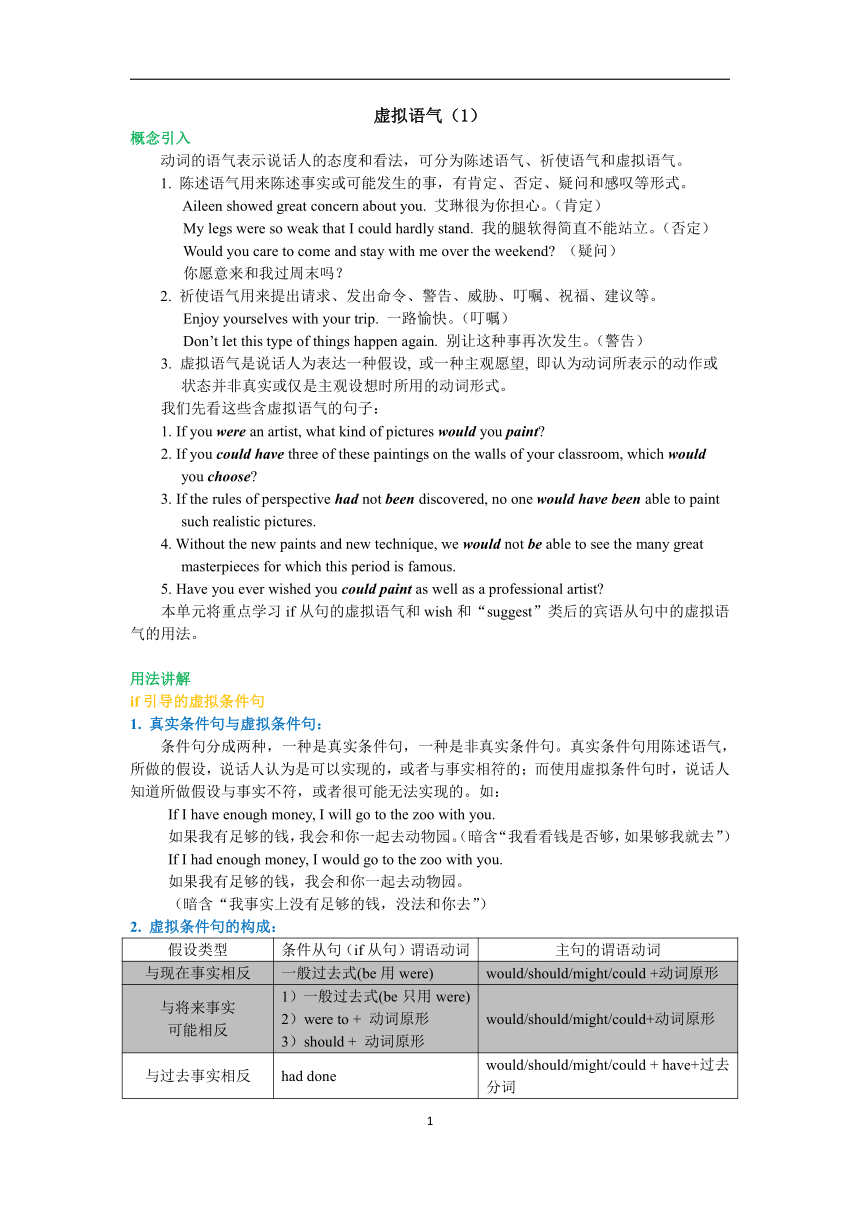 | |
| 格式 | zip | ||
| 文件大小 | 46.6KB | ||
| 资源类型 | 教案 | ||
| 版本资源 | 人教版(新课程标准) | ||
| 科目 | 英语 | ||
| 更新时间 | 2019-07-22 22:33:02 | ||
图片预览

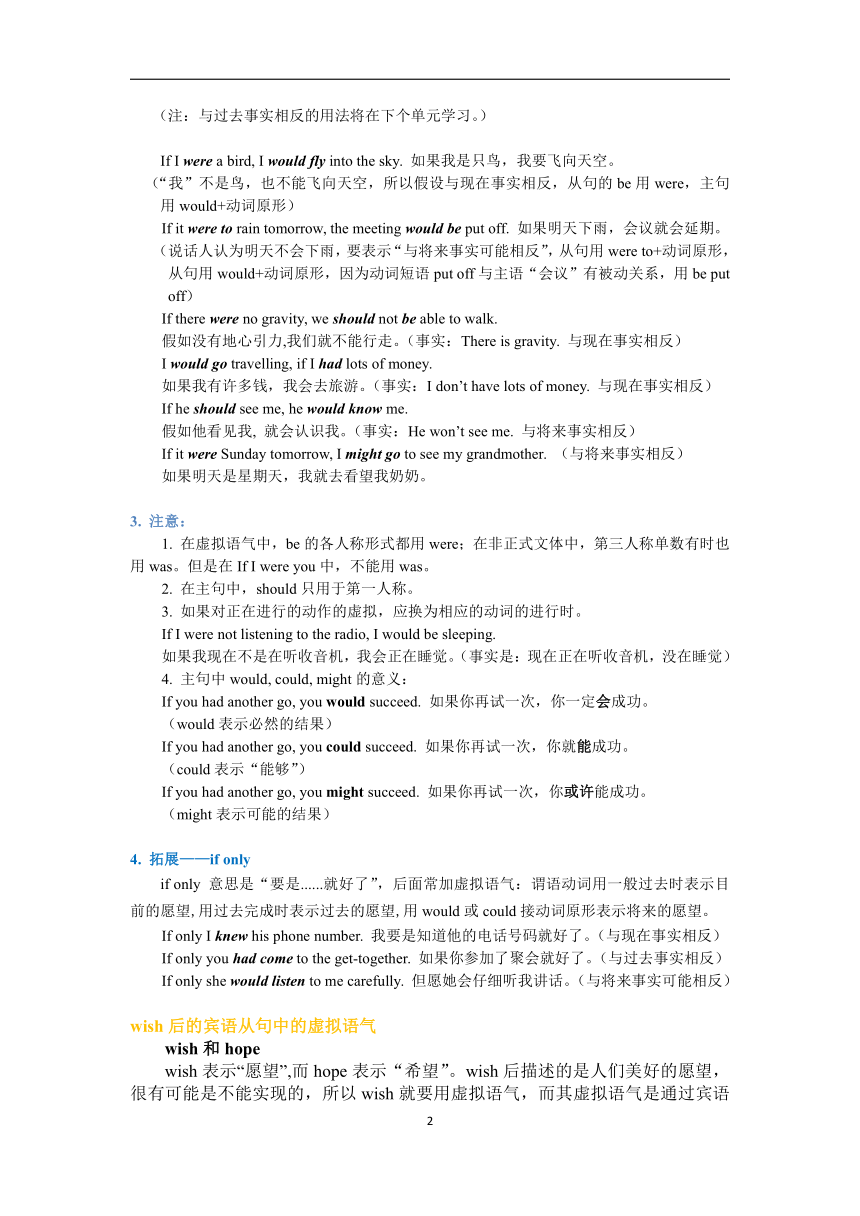
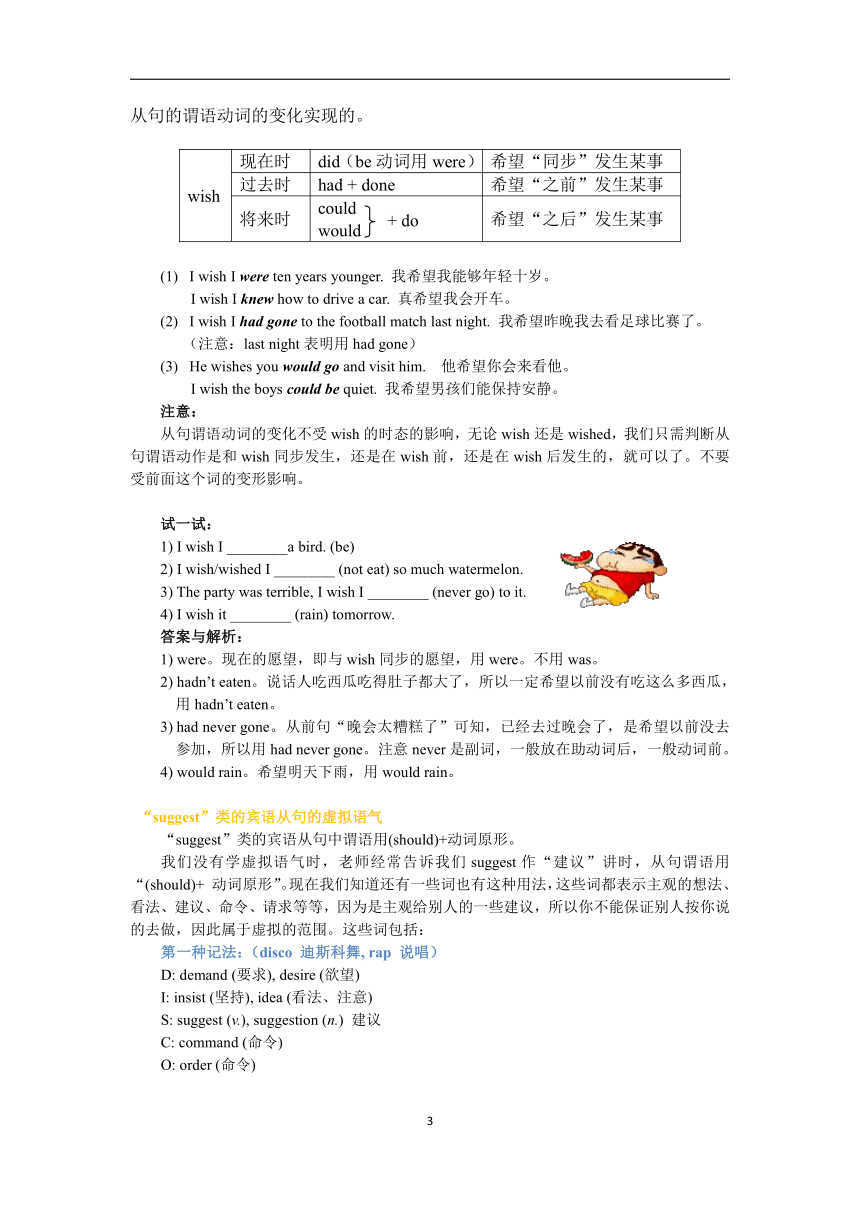
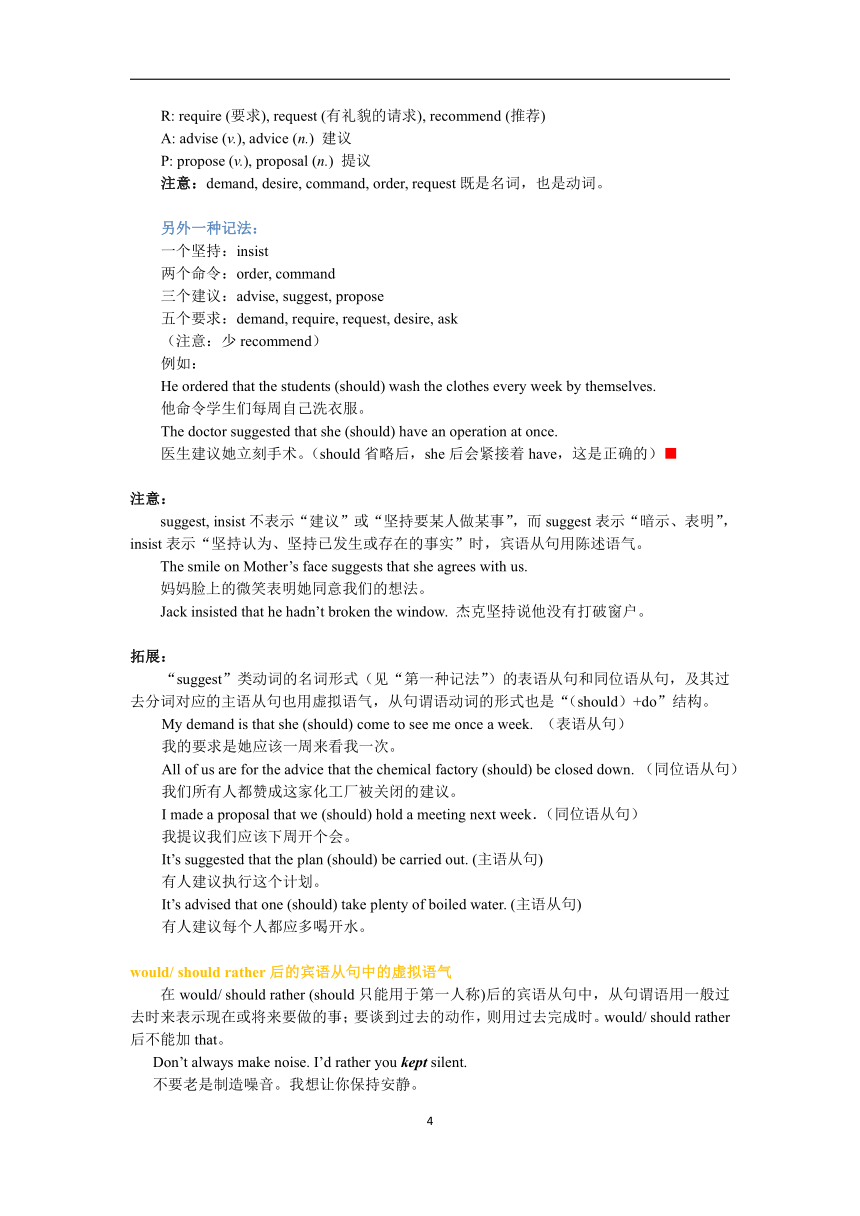
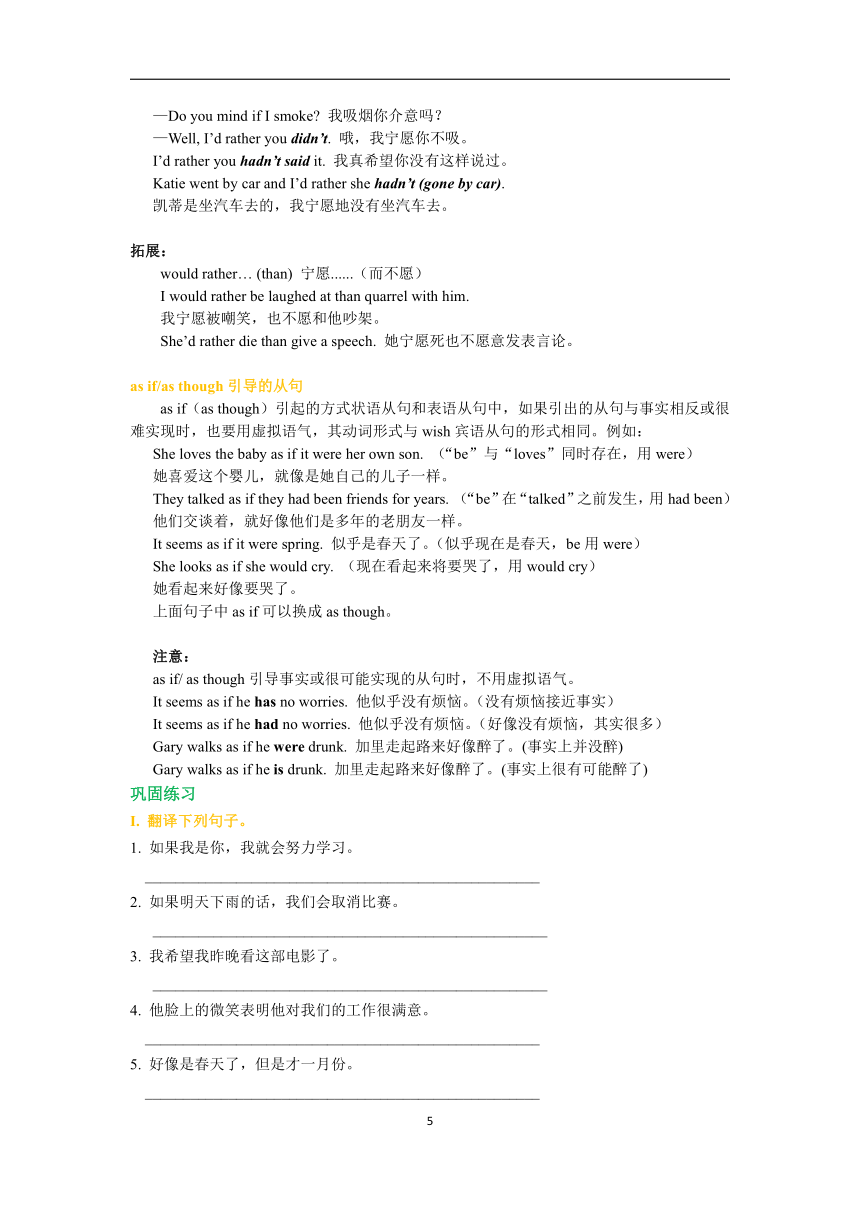
文档简介
虚拟语气(1)
概念引入
动词的语气表示说话人的态度和看法,可分为陈述语气、祈使语气和虚拟语气。
1. 陈述语气用来陈述事实或可能发生的事,有肯定、否定、疑问和感叹等形式。
Aileen showed great concern about you. 艾琳很为你担心。(肯定)
My legs were so weak that I could hardly stand. 我的腿软得简直不能站立。(否定)
Would you care to come and stay with me over the weekend? (疑问)
你愿意来和我过周末吗?
2. 祈使语气用来提出请求、发出命令、警告、威胁、叮嘱、祝福、建议等。
Enjoy yourselves with your trip. 一路愉快。(叮嘱)
Don’t let this type of things happen again. 别让这种事再次发生。(警告)
3. 虚拟语气是说话人为表达一种假设, 或一种主观愿望, 即认为动词所表示的动作或状态并非真实或仅是主观设想时所用的动词形式。
我们先看这些含虚拟语气的句子:
1. If you were an artist, what kind of pictures would you paint?
2. If you could have three of these paintings on the walls of your classroom, which would you choose?
3. If the rules of perspective had not been discovered, no one would have been able to paint such realistic pictures.
4. Without the new paints and new technique, we would not be able to see the many great masterpieces for which this period is famous.
5. Have you ever wished you could paint as well as a professional artist?
本单元将重点学习if从句的虚拟语气和wish和“suggest”类后的宾语从句中的虚拟语气的用法。
用法讲解
if引导的虚拟条件句
1. 真实条件句与虚拟条件句:
条件句分成两种,一种是真实条件句,一种是非真实条件句。真实条件句用陈述语气,所做的假设,说话人认为是可以实现的,或者与事实相符的;而使用虚拟条件句时,说话人知道所做假设与事实不符,或者很可能无法实现的。如:
If I have enough money, I will go to the zoo with you.
如果我有足够的钱,我会和你一起去动物园。(暗含“我看看钱是否够,如果够我就去”)
If I had enough money, I would go to the zoo with you.
如果我有足够的钱,我会和你一起去动物园。
(暗含“我事实上没有足够的钱,没法和你去”)
2. 虚拟条件句的构成:
假设类型
条件从句(if从句)谓语动词
主句的谓语动词
与现在事实相反
一般过去式(be用were)
would/should/might/could +动词原形
与将来事实
可能相反
1)一般过去式(be只用were)
2)were to + 动词原形
3)should + 动词原形
would/should/might/could+动词原形
与过去事实相反
had done
would/should/might/could + have+过去分词
(注:与过去事实相反的用法将在下个单元学习。)
If I were a bird, I would fly into the sky. 如果我是只鸟,我要飞向天空。
(“我”不是鸟,也不能飞向天空,所以假设与现在事实相反,从句的be用were,主句用would+动词原形)
If it were to rain tomorrow, the meeting would be put off. 如果明天下雨,会议就会延期。
(说话人认为明天不会下雨,要表示“与将来事实可能相反”,从句用were to+动词原形,从句用would+动词原形,因为动词短语put off与主语“会议”有被动关系,用be put off)
If there were no gravity, we should not be able to walk.
假如没有地心引力,我们就不能行走。(事实:There is gravity. 与现在事实相反)
I would go travelling, if I had lots of money.
如果我有许多钱,我会去旅游。(事实:I don’t have lots of money. 与现在事实相反)
If he should see me, he would know me.
假如他看见我, 就会认识我。(事实:He won’t see me. 与将来事实相反)
If it were Sunday tomorrow, I might go to see my grandmother. (与将来事实相反)
如果明天是星期天,我就去看望我奶奶。
3. 注意:
1. 在虚拟语气中,be的各人称形式都用were;在非正式文体中,第三人称单数有时也用was。但是在If I were you中,不能用was。
2. 在主句中,should只用于第一人称。
3. 如果对正在进行的动作的虚拟,应换为相应的动词的进行时。
If I were not listening to the radio, I would be sleeping.
如果我现在不是在听收音机,我会正在睡觉。(事实是:现在正在听收音机,没在睡觉)
4. 主句中would, could, might的意义:
If you had another go, you would succeed. 如果你再试一次,你一定会成功。
(would表示必然的结果)
If you had another go, you could succeed. 如果你再试一次,你就能成功。
(could表示“能够”)
If you had another go, you might succeed. 如果你再试一次,你或许能成功。
(might表示可能的结果)
4. 拓展——if only
if only 意思是“要是......就好了”,后面常加虚拟语气:谓语动词用一般过去时表示目前的愿望,用过去完成时表示过去的愿望,用would或could接动词原形表示将来的愿望。
If only I knew his phone number. 我要是知道他的电话号码就好了。(与现在事实相反)
If only you had come to the get-together. 如果你参加了聚会就好了。(与过去事实相反)
If only she would listen to me carefully. 但愿她会仔细听我讲话。(与将来事实可能相反)
wish后的宾语从句中的虚拟语气
wish和hope
wish表示“愿望”,而hope表示“希望”。wish后描述的是人们美好的愿望,很有可能是不能实现的,所以wish就要用虚拟语气,而其虚拟语气是通过宾语从句的谓语动词的变化实现的。
wish
现在时
did(be动词用were)
希望“同步”发生某事
过去时
had + done
希望“之前”发生某事
将来时
could
would
希望“之后”发生某事
(1)? I wish I were ten years younger. 我希望我能够年轻十岁。
I wish I knew how to drive a car. 真希望我会开车。
(2)? I wish I had gone to the football match last night. 我希望昨晚我去看足球比赛了。
(注意:last night表明用had gone)
(3)? He wishes you would go and visit him. 他希望你会来看他。
I wish the boys could be quiet. 我希望男孩们能保持安静。
注意:
从句谓语动词的变化不受wish的时态的影响,无论wish还是wished,我们只需判断从句谓语动作是和wish同步发生,还是在wish前,还是在wish后发生的,就可以了。不要受前面这个词的变形影响。
试一试:
1) I wish I ________a bird. (be)
2) I wish/wished I ________ (not eat) so much watermelon.
3) The party was terrible, I wish I ________ (never go) to it.
4) I wish it ________ (rain) tomorrow.
答案与解析:
1) were。现在的愿望,即与wish同步的愿望,用were。不用was。
2) hadn’t eaten。说话人吃西瓜吃得肚子都大了,所以一定希望以前没有吃这么多西瓜,用hadn’t eaten。
3) had never gone。从前句“晚会太糟糕了”可知,已经去过晚会了,是希望以前没去参加,所以用had never gone。注意never是副词,一般放在助动词后,一般动词前。
4) would rain。希望明天下雨,用would rain。
“suggest”类的宾语从句的虚拟语气
“suggest”类的宾语从句中谓语用(should)+动词原形。
我们没有学虚拟语气时,老师经常告诉我们suggest作“建议”讲时,从句谓语用“(should)+ 动词原形”。现在我们知道还有一些词也有这种用法,这些词都表示主观的想法、看法、建议、命令、请求等等,因为是主观给别人的一些建议,所以你不能保证别人按你说的去做,因此属于虚拟的范围。这些词包括:
第一种记法:(disco 迪斯科舞, rap 说唱)
D: demand (要求), desire (欲望)
I: insist (坚持), idea (看法、注意)
S: suggest (v.), suggestion (n.) 建议
C: command (命令)
O: order (命令)
R: require (要求), request (有礼貌的请求), recommend (推荐)
A: advise (v.), advice (n.) 建议
P: propose (v.), proposal (n.) 提议
注意:demand, desire, command, order, request既是名词,也是动词。
另外一种记法:
一个坚持:insist
两个命令:order, command
三个建议:advise, suggest, propose
五个要求:demand, require, request, desire, ask
(注意:少recommend)
例如:
He ordered that the students (should) wash the clothes every week by themselves.
他命令学生们每周自己洗衣服。
The doctor suggested that she (should) have an operation at once.
医生建议她立刻手术。(should省略后,she后会紧接着have,这是正确的)■
注意:
suggest, insist不表示“建议”或“坚持要某人做某事”,而suggest表示“暗示、表明”,insist表示“坚持认为、坚持已发生或存在的事实”时,宾语从句用陈述语气。
The smile on Mother’s face suggests that she agrees with us.
妈妈脸上的微笑表明她同意我们的想法。
Jack insisted that he hadn’t broken the window. 杰克坚持说他没有打破窗户。
拓展:
“suggest”类动词的名词形式(见“第一种记法”)的表语从句和同位语从句,及其过去分词对应的主语从句也用虚拟语气,从句谓语动词的形式也是“(should)+do”结构。
My demand is that she (should) come to see me once a week. (表语从句)
我的要求是她应该一周来看我一次。
All of us are for the advice that the chemical factory (should) be closed down. (同位语从句)
我们所有人都赞成这家化工厂被关闭的建议。
I made a proposal that we (should) hold a meeting next week.(同位语从句)
我提议我们应该下周开个会。
It’s suggested that the plan (should) be carried out. (主语从句)
有人建议执行这个计划。
It’s advised that one (should) take plenty of boiled water. (主语从句)
有人建议每个人都应多喝开水。
would/ should rather后的宾语从句中的虚拟语气
在would/ should rather (should只能用于第一人称)后的宾语从句中,从句谓语用一般过去时来表示现在或将来要做的事;要谈到过去的动作,则用过去完成时。would/ should rather后不能加that。
Don’t always make noise. I’d rather you kept silent.
不要老是制造噪音。我想让你保持安静。
—Do you mind if I smoke? 我吸烟你介意吗?
—Well, I’d rather you didn’t. 哦,我宁愿你不吸。
I’d rather you hadn’t said it. 我真希望你没有这样说过。
Katie went by car and I’d rather she hadn’t (gone by car).
凯蒂是坐汽车去的,我宁愿地没有坐汽车去。
拓展:
would rather… (than) 宁愿......(而不愿)
I would rather be laughed at than quarrel with him.
我宁愿被嘲笑,也不愿和他吵架。
She’d rather die than give a speech. 她宁愿死也不愿意发表言论。
as if/as though引导的从句
as if(as though)引起的方式状语从句和表语从句中,如果引出的从句与事实相反或很难实现时,也要用虚拟语气,其动词形式与wish宾语从句的形式相同。例如:
She loves the baby as if it were her own son. (“be”与“loves”同时存在,用were)
她喜爱这个婴儿,就像是她自己的儿子一样。
They talked as if they had been friends for years. (“be”在“talked”之前发生,用had been)
他们交谈着,就好像他们是多年的老朋友一样。
It seems as if it were spring. 似乎是春天了。(似乎现在是春天,be用were)
She looks as if she would cry. (现在看起来将要哭了,用would cry)
她看起来好像要哭了。
上面句子中as if可以换成as though。
注意:
as if/ as though引导事实或很可能实现的从句时,不用虚拟语气。
It seems as if he has no worries. 他似乎没有烦恼。(没有烦恼接近事实)
It seems as if he had no worries. 他似乎没有烦恼。(好像没有烦恼,其实很多)
Gary walks as if he were drunk. 加里走起路来好像醉了。(事实上并没醉)
Gary walks as if he is drunk. 加里走起路来好像醉了。(事实上很有可能醉了)
巩固练习
Ⅰ. 翻译下列句子。
1. 如果我是你,我就会努力学习。
____________________________________________________
2. 如果明天下雨的话,我们会取消比赛。
____________________________________________________
3. 我希望我昨晚看这部电影了。
____________________________________________________
4. 他脸上的微笑表明他对我们的工作很满意。
____________________________________________________
5. 好像是春天了,但是才一月份。
____________________________________________________
6. 他们要求我们派他们去那儿工作。
____________________________________________________
7. 他坚决要求我到场。
____________________________________________________
8. 假如明天他来了, 我们对他说什么呢?
____________________________________________________
9. 我们希望我们的父母不会惩罚我们。
____________________________________________________
10. 如果没有水和空气,地球上就不会有生物。
____________________________________________________
Ⅱ. 用所给词或词组的适当形式填空。
1. If I _______ (be) Tom, I would not do such a thing.
2. If I _______ (know) her well, I would tell you about her.
3. I wish I _______ (be) ten years younger now.
4. I wish I _______ (meet) him yesterday, but I was too busy yesterday.
5. I wish I _______ (can be) a scientist in the future.
6. The picture exhibition bored me to death; I wish I _______ (not go) to it.
7. What ______ you _______ (do) if you _______ (win) the lottery?
8. If I should go abroad, I ________ (go) to America.
9. The teacher advised that we _______ good use of every minute here.
10. His excited expression suggested that he_______ (succeed) in this exam.
Ⅲ. 单项选择。
1. If I _________ plan to do anything I want to, I would go to Tibet and travel through as much of it as possible.
A. would B. could C. had to D. ought to
2. If he _________ me tomorrow, I would let you know.
A. should call B. should have called C. has called D. call
3. Jane’s face suggested that she________ ill, and her parents suggested that she________ a medical examination.
A. be; should have B. was; have C. should be; had D. was; has
4. How I wish every family________ a large house with a beautiful garden.
A. has B. had C. will have D. had had
5. The boy acted ____ he had never lived in Canada before.
A. as though B. even if C. as D. since
6. The guard at the gate insisted that everybody ________ the rules.
A. obeys B. obey C. will obey D. would obey
7. The Jade Emperor ordered that the Monkey King _____ right away.
A. would be arrested B. must be arrested C. be arrested D. had to be arrested
8. Robert wishes that he ________ business instead of history when he was in university.
A. studies B. studied C. has studied D. had studied
9. My suggestion is that she ________ more exercise, which will do a lot of good to her.
A. takes B. must take C. take D. took
10. He speaks Chinese as fluently as if he __________ a Chinese.
A. were B. had been C. is D. has been
11. Don’t touch the sleeping tiger. If he woke up, he _____ you.
A. would come to B. would come at C. would have come toward D. will come to
12. How I wish I ____ to repair the watch! I only made it worse.
A. had tried B. hadn’t tried C. have tried D. didn’t try
13. I recommended that the student _______ his composition as soon as possible.
A. finishing writing B. should finish the writing C. finish writing D. finished writing
14. He insisted that his wife _______ the housework, but she thought they should share the work.
A. did B. would do C. do D. were doing
15. The workers in the factory demanded that their pay ________ by 20 percent.
A. be raised B. would be raised C. raised D. raise
16. We ______ delighted if the report ______ true.
A. were;were B. shall be;were C. should be;were D. were;would be
17. I would rather you ______anything about it for the time being.
A. do B. didn’t do C. don’t do D. wouldn’t do
18. The Law requires that everyone _______ his car checked at least once a year.
A. has B. had C. have D. will have
19. The sun rises in the east and sets in the west, so it seems as if the sun ________round the earth.
A. were circling B. circles C. is circling D. be circling
20. It seems as if it _______ rain. Look at the dark clouds.
A. will to B. is going to C. is to D. were going to
21. The teacher agreed to the suggestion that the students _______ two weeks to prepare for the exam.
A. give B. should give C. be given D. would be given
22. ---- I thought you would come back tomorrow.
---- I would if I ______ to attend a meeting.
A. don’t have B. didn’t have C. will not have D. would not have
23. It was requested that the play _______again.
A. should put on B. would put on C. be put on D. put on
24. This printer is of good quality. If it ________ break down within the first year, we would repair it at our expense.
A. would B. should C. could D. might
25. ----Did you scold him for his carelessness?
----Yes, but _______ it.
A. I’d rather not do B. I’d rather I hadn’t done
C. I should’ t do D. I’d better not do
答案与解析:
Ⅰ. 翻译下列句子。
1. If I were you, I would work harder at my lessons.
2. If it rained/ should rain /were to rain, we would call off the match.
3. I wish (that) I had seen the film last night.
4. The smile on his face suggested that he was satisfied with our work.
5. It seems as if it were spring, but it is just January.
6. They requested that we should send them to work there.
7. He insisted that I (should) be present
8. If he were to come tomorrow, what should we say to him?
9. We wish our parents wouldn’t punish us.
10. If there were no air or water, there would be no living things on the earth.
Ⅱ. 用所给词或词组的适当形式填空。
1. were。与现在事实相反,条件句用一般过去时,be用were。
2. knew。与现在事实相反,条件句用一般过去时,know的过去式是knew。
3. were。希望与现在事实相反的事, be用were。
4. had met。希望与过去相反的事,用过去完成时。
5. could be。希望将来发生的可能性很小的事,用could+动词原形。
6. had not gone。从上句bored可知,下句中的愿望“不去”与过去事实相反,用had done。
7. would; do; won。句意:如果你赢了彩票,你会做什么?与现在或将来事实相反的虚拟语气,从句用过去时won,而主句用would do。
8. would go。由从句中should可知,句子与将来事实相反,主句would/could/might+动词原形。
9. should make/ make。advise所接宾语从句的谓语动词用should+动词原形,should可省。
10. had succeeded。suggest此句中表示“暗示,表明”,从句不用虚拟语气,而动词succeed应发生在suggested之前,所以用过去完成时。
Ⅲ. 单项选择。
1. B。could 是“can”的过去式,表示“能够,可以”,表示与现在事实(不能做这种计划)相反的虚拟语气。
2. A。由tomorrow可知从句与将来事实相反,所以选A。
3. B。第一个suggest意为“表明”,宾语从句不用虚拟语气,谓语用was;第二个suggest表示“建议”,宾语从句用虚拟语气“should+动词原形”,should可以省略。
4. B。每一家都有一个带花园的大房子是一种很难实现的愿望,wish后的虚拟语气用过去式表示对现在或将来的虚拟。
5. A。根据句意可知。as though(好像)连接的从句,从句中用了过去完成时表示在acted之前发生的事。even if即使。
6. B。insist 在此句中表示“坚决要求”,后接的宾语从句要用虚拟语气,形式是should+动词原形,should可省略。
7. C。order的宾语从句用虚拟语气“(should)+动词原形”,因为美猴王是被逮捕的,用被动语态,前面省略了should。句意:玉帝命令立刻逮捕美猴王。
8. D。从when引导的时间状语从句可知“study business”是发生在wishes前,是与过去事实相反的希望,所以用过去完成时(had studied business)。
9. C。主语是suggestion,表语从句的谓语用“should+动词原形”的虚拟结构,should可以省略。
10. A。as if引出的状语从句用一般过去时表示与“speaks”同时存在的事实相反的虚拟。
11. B。从句意和if从句可知,主句也是与现在事实相反,应用would+动词原形;come to 向某个方向走来,come at 袭击,攻击,达到。
12. B。从下句可知,修手表的事已经做过了,而且把手表弄得更糟,所以说话人一定希望过去没有做过此事,所以用过去完成时的否定形式。
13. C。recommend(推荐、劝告、建议)后宾语从句的谓语一般用虚拟语气形式“(should) +动词原形”;finish后接动词的-ing形式,finish writing 写完。因writing后有宾语,前面不能加the变成名词,排除B。
14. C。从句意可知,insist在此句中意为“坚决主张”,所接宾语从句要用“should+动词原形”,should可以省略。
15. A。demand所接宾语从句要用“should+动词原形”,should可以省略。
16. C。句意:如果报告是真的,我们会很高兴。从句意中可知,这个情况可以是现在的事实,也可以是与现在事实相反的虚拟语气,选项B中主句谓语应为should be或if从句的谓语动词用is,错误;所以选项C正确,从句用过去时,be用were,而主句用should+动词原形。一定注意此句if从句在后。
17. B。would rather后面的从句中谓语用一般过去时表示现在或将来要做的事;要谈到过去的动作,则用过去完成时hadn’t done。从句意和for the time being(暂且)可知应该是与现在事实相反,选B。
18. C。require(要求)后的宾语从句用“(should)+动词原形”形式的虚拟语气。
19. A。句意:太阳东方升起,西方落下,好像太阳绕着地球转似的,“太阳绕着地球转”与事实相反的,而且太阳的运行正在进行,所以用过去进行时表示现在进行时的虚拟语气。
20. B。从下文可知,“天要下雨”是符合事实的,不用虚拟语气。所以选B。
21. C。suggestion后接的同位语从句的谓语用虚拟语气(should)do,should可以省略。句意:老师同意给学生两周准备考试的建议。
22. B。从tomorrow可知,答语与将来事实相反,if从句用过去时,所以选B。主句省略了come back tomorrow。
23. C。request(要求)的过去分词后的主语从句,谓语动词要用虚拟语气(should)+动词原形。句意:按要求这部戏会再次上演。
24. B。句意:这种打印机质量很好。如果一年之内出了问题,我们会免费修理。从句意可知,if从句是与将来事实相反的虚拟语气,从句中用should+动词原形的结构。因为没有“能”的含义,不能用could。
25. B。从对话可知答话人已经批评了“他”,而宁愿没有做过。would rather后宾语从句的谓语动词用一般过去时表示宁愿现在和将来做某事,用过去完成时表示宁愿过去做过某事。
概念引入
动词的语气表示说话人的态度和看法,可分为陈述语气、祈使语气和虚拟语气。
1. 陈述语气用来陈述事实或可能发生的事,有肯定、否定、疑问和感叹等形式。
Aileen showed great concern about you. 艾琳很为你担心。(肯定)
My legs were so weak that I could hardly stand. 我的腿软得简直不能站立。(否定)
Would you care to come and stay with me over the weekend? (疑问)
你愿意来和我过周末吗?
2. 祈使语气用来提出请求、发出命令、警告、威胁、叮嘱、祝福、建议等。
Enjoy yourselves with your trip. 一路愉快。(叮嘱)
Don’t let this type of things happen again. 别让这种事再次发生。(警告)
3. 虚拟语气是说话人为表达一种假设, 或一种主观愿望, 即认为动词所表示的动作或状态并非真实或仅是主观设想时所用的动词形式。
我们先看这些含虚拟语气的句子:
1. If you were an artist, what kind of pictures would you paint?
2. If you could have three of these paintings on the walls of your classroom, which would you choose?
3. If the rules of perspective had not been discovered, no one would have been able to paint such realistic pictures.
4. Without the new paints and new technique, we would not be able to see the many great masterpieces for which this period is famous.
5. Have you ever wished you could paint as well as a professional artist?
本单元将重点学习if从句的虚拟语气和wish和“suggest”类后的宾语从句中的虚拟语气的用法。
用法讲解
if引导的虚拟条件句
1. 真实条件句与虚拟条件句:
条件句分成两种,一种是真实条件句,一种是非真实条件句。真实条件句用陈述语气,所做的假设,说话人认为是可以实现的,或者与事实相符的;而使用虚拟条件句时,说话人知道所做假设与事实不符,或者很可能无法实现的。如:
If I have enough money, I will go to the zoo with you.
如果我有足够的钱,我会和你一起去动物园。(暗含“我看看钱是否够,如果够我就去”)
If I had enough money, I would go to the zoo with you.
如果我有足够的钱,我会和你一起去动物园。
(暗含“我事实上没有足够的钱,没法和你去”)
2. 虚拟条件句的构成:
假设类型
条件从句(if从句)谓语动词
主句的谓语动词
与现在事实相反
一般过去式(be用were)
would/should/might/could +动词原形
与将来事实
可能相反
1)一般过去式(be只用were)
2)were to + 动词原形
3)should + 动词原形
would/should/might/could+动词原形
与过去事实相反
had done
would/should/might/could + have+过去分词
(注:与过去事实相反的用法将在下个单元学习。)
If I were a bird, I would fly into the sky. 如果我是只鸟,我要飞向天空。
(“我”不是鸟,也不能飞向天空,所以假设与现在事实相反,从句的be用were,主句用would+动词原形)
If it were to rain tomorrow, the meeting would be put off. 如果明天下雨,会议就会延期。
(说话人认为明天不会下雨,要表示“与将来事实可能相反”,从句用were to+动词原形,从句用would+动词原形,因为动词短语put off与主语“会议”有被动关系,用be put off)
If there were no gravity, we should not be able to walk.
假如没有地心引力,我们就不能行走。(事实:There is gravity. 与现在事实相反)
I would go travelling, if I had lots of money.
如果我有许多钱,我会去旅游。(事实:I don’t have lots of money. 与现在事实相反)
If he should see me, he would know me.
假如他看见我, 就会认识我。(事实:He won’t see me. 与将来事实相反)
If it were Sunday tomorrow, I might go to see my grandmother. (与将来事实相反)
如果明天是星期天,我就去看望我奶奶。
3. 注意:
1. 在虚拟语气中,be的各人称形式都用were;在非正式文体中,第三人称单数有时也用was。但是在If I were you中,不能用was。
2. 在主句中,should只用于第一人称。
3. 如果对正在进行的动作的虚拟,应换为相应的动词的进行时。
If I were not listening to the radio, I would be sleeping.
如果我现在不是在听收音机,我会正在睡觉。(事实是:现在正在听收音机,没在睡觉)
4. 主句中would, could, might的意义:
If you had another go, you would succeed. 如果你再试一次,你一定会成功。
(would表示必然的结果)
If you had another go, you could succeed. 如果你再试一次,你就能成功。
(could表示“能够”)
If you had another go, you might succeed. 如果你再试一次,你或许能成功。
(might表示可能的结果)
4. 拓展——if only
if only 意思是“要是......就好了”,后面常加虚拟语气:谓语动词用一般过去时表示目前的愿望,用过去完成时表示过去的愿望,用would或could接动词原形表示将来的愿望。
If only I knew his phone number. 我要是知道他的电话号码就好了。(与现在事实相反)
If only you had come to the get-together. 如果你参加了聚会就好了。(与过去事实相反)
If only she would listen to me carefully. 但愿她会仔细听我讲话。(与将来事实可能相反)
wish后的宾语从句中的虚拟语气
wish和hope
wish表示“愿望”,而hope表示“希望”。wish后描述的是人们美好的愿望,很有可能是不能实现的,所以wish就要用虚拟语气,而其虚拟语气是通过宾语从句的谓语动词的变化实现的。
wish
现在时
did(be动词用were)
希望“同步”发生某事
过去时
had + done
希望“之前”发生某事
将来时
could
would
希望“之后”发生某事
(1)? I wish I were ten years younger. 我希望我能够年轻十岁。
I wish I knew how to drive a car. 真希望我会开车。
(2)? I wish I had gone to the football match last night. 我希望昨晚我去看足球比赛了。
(注意:last night表明用had gone)
(3)? He wishes you would go and visit him. 他希望你会来看他。
I wish the boys could be quiet. 我希望男孩们能保持安静。
注意:
从句谓语动词的变化不受wish的时态的影响,无论wish还是wished,我们只需判断从句谓语动作是和wish同步发生,还是在wish前,还是在wish后发生的,就可以了。不要受前面这个词的变形影响。
试一试:
1) I wish I ________a bird. (be)
2) I wish/wished I ________ (not eat) so much watermelon.
3) The party was terrible, I wish I ________ (never go) to it.
4) I wish it ________ (rain) tomorrow.
答案与解析:
1) were。现在的愿望,即与wish同步的愿望,用were。不用was。
2) hadn’t eaten。说话人吃西瓜吃得肚子都大了,所以一定希望以前没有吃这么多西瓜,用hadn’t eaten。
3) had never gone。从前句“晚会太糟糕了”可知,已经去过晚会了,是希望以前没去参加,所以用had never gone。注意never是副词,一般放在助动词后,一般动词前。
4) would rain。希望明天下雨,用would rain。
“suggest”类的宾语从句的虚拟语气
“suggest”类的宾语从句中谓语用(should)+动词原形。
我们没有学虚拟语气时,老师经常告诉我们suggest作“建议”讲时,从句谓语用“(should)+ 动词原形”。现在我们知道还有一些词也有这种用法,这些词都表示主观的想法、看法、建议、命令、请求等等,因为是主观给别人的一些建议,所以你不能保证别人按你说的去做,因此属于虚拟的范围。这些词包括:
第一种记法:(disco 迪斯科舞, rap 说唱)
D: demand (要求), desire (欲望)
I: insist (坚持), idea (看法、注意)
S: suggest (v.), suggestion (n.) 建议
C: command (命令)
O: order (命令)
R: require (要求), request (有礼貌的请求), recommend (推荐)
A: advise (v.), advice (n.) 建议
P: propose (v.), proposal (n.) 提议
注意:demand, desire, command, order, request既是名词,也是动词。
另外一种记法:
一个坚持:insist
两个命令:order, command
三个建议:advise, suggest, propose
五个要求:demand, require, request, desire, ask
(注意:少recommend)
例如:
He ordered that the students (should) wash the clothes every week by themselves.
他命令学生们每周自己洗衣服。
The doctor suggested that she (should) have an operation at once.
医生建议她立刻手术。(should省略后,she后会紧接着have,这是正确的)■
注意:
suggest, insist不表示“建议”或“坚持要某人做某事”,而suggest表示“暗示、表明”,insist表示“坚持认为、坚持已发生或存在的事实”时,宾语从句用陈述语气。
The smile on Mother’s face suggests that she agrees with us.
妈妈脸上的微笑表明她同意我们的想法。
Jack insisted that he hadn’t broken the window. 杰克坚持说他没有打破窗户。
拓展:
“suggest”类动词的名词形式(见“第一种记法”)的表语从句和同位语从句,及其过去分词对应的主语从句也用虚拟语气,从句谓语动词的形式也是“(should)+do”结构。
My demand is that she (should) come to see me once a week. (表语从句)
我的要求是她应该一周来看我一次。
All of us are for the advice that the chemical factory (should) be closed down. (同位语从句)
我们所有人都赞成这家化工厂被关闭的建议。
I made a proposal that we (should) hold a meeting next week.(同位语从句)
我提议我们应该下周开个会。
It’s suggested that the plan (should) be carried out. (主语从句)
有人建议执行这个计划。
It’s advised that one (should) take plenty of boiled water. (主语从句)
有人建议每个人都应多喝开水。
would/ should rather后的宾语从句中的虚拟语气
在would/ should rather (should只能用于第一人称)后的宾语从句中,从句谓语用一般过去时来表示现在或将来要做的事;要谈到过去的动作,则用过去完成时。would/ should rather后不能加that。
Don’t always make noise. I’d rather you kept silent.
不要老是制造噪音。我想让你保持安静。
—Do you mind if I smoke? 我吸烟你介意吗?
—Well, I’d rather you didn’t. 哦,我宁愿你不吸。
I’d rather you hadn’t said it. 我真希望你没有这样说过。
Katie went by car and I’d rather she hadn’t (gone by car).
凯蒂是坐汽车去的,我宁愿地没有坐汽车去。
拓展:
would rather… (than) 宁愿......(而不愿)
I would rather be laughed at than quarrel with him.
我宁愿被嘲笑,也不愿和他吵架。
She’d rather die than give a speech. 她宁愿死也不愿意发表言论。
as if/as though引导的从句
as if(as though)引起的方式状语从句和表语从句中,如果引出的从句与事实相反或很难实现时,也要用虚拟语气,其动词形式与wish宾语从句的形式相同。例如:
She loves the baby as if it were her own son. (“be”与“loves”同时存在,用were)
她喜爱这个婴儿,就像是她自己的儿子一样。
They talked as if they had been friends for years. (“be”在“talked”之前发生,用had been)
他们交谈着,就好像他们是多年的老朋友一样。
It seems as if it were spring. 似乎是春天了。(似乎现在是春天,be用were)
She looks as if she would cry. (现在看起来将要哭了,用would cry)
她看起来好像要哭了。
上面句子中as if可以换成as though。
注意:
as if/ as though引导事实或很可能实现的从句时,不用虚拟语气。
It seems as if he has no worries. 他似乎没有烦恼。(没有烦恼接近事实)
It seems as if he had no worries. 他似乎没有烦恼。(好像没有烦恼,其实很多)
Gary walks as if he were drunk. 加里走起路来好像醉了。(事实上并没醉)
Gary walks as if he is drunk. 加里走起路来好像醉了。(事实上很有可能醉了)
巩固练习
Ⅰ. 翻译下列句子。
1. 如果我是你,我就会努力学习。
____________________________________________________
2. 如果明天下雨的话,我们会取消比赛。
____________________________________________________
3. 我希望我昨晚看这部电影了。
____________________________________________________
4. 他脸上的微笑表明他对我们的工作很满意。
____________________________________________________
5. 好像是春天了,但是才一月份。
____________________________________________________
6. 他们要求我们派他们去那儿工作。
____________________________________________________
7. 他坚决要求我到场。
____________________________________________________
8. 假如明天他来了, 我们对他说什么呢?
____________________________________________________
9. 我们希望我们的父母不会惩罚我们。
____________________________________________________
10. 如果没有水和空气,地球上就不会有生物。
____________________________________________________
Ⅱ. 用所给词或词组的适当形式填空。
1. If I _______ (be) Tom, I would not do such a thing.
2. If I _______ (know) her well, I would tell you about her.
3. I wish I _______ (be) ten years younger now.
4. I wish I _______ (meet) him yesterday, but I was too busy yesterday.
5. I wish I _______ (can be) a scientist in the future.
6. The picture exhibition bored me to death; I wish I _______ (not go) to it.
7. What ______ you _______ (do) if you _______ (win) the lottery?
8. If I should go abroad, I ________ (go) to America.
9. The teacher advised that we _______ good use of every minute here.
10. His excited expression suggested that he_______ (succeed) in this exam.
Ⅲ. 单项选择。
1. If I _________ plan to do anything I want to, I would go to Tibet and travel through as much of it as possible.
A. would B. could C. had to D. ought to
2. If he _________ me tomorrow, I would let you know.
A. should call B. should have called C. has called D. call
3. Jane’s face suggested that she________ ill, and her parents suggested that she________ a medical examination.
A. be; should have B. was; have C. should be; had D. was; has
4. How I wish every family________ a large house with a beautiful garden.
A. has B. had C. will have D. had had
5. The boy acted ____ he had never lived in Canada before.
A. as though B. even if C. as D. since
6. The guard at the gate insisted that everybody ________ the rules.
A. obeys B. obey C. will obey D. would obey
7. The Jade Emperor ordered that the Monkey King _____ right away.
A. would be arrested B. must be arrested C. be arrested D. had to be arrested
8. Robert wishes that he ________ business instead of history when he was in university.
A. studies B. studied C. has studied D. had studied
9. My suggestion is that she ________ more exercise, which will do a lot of good to her.
A. takes B. must take C. take D. took
10. He speaks Chinese as fluently as if he __________ a Chinese.
A. were B. had been C. is D. has been
11. Don’t touch the sleeping tiger. If he woke up, he _____ you.
A. would come to B. would come at C. would have come toward D. will come to
12. How I wish I ____ to repair the watch! I only made it worse.
A. had tried B. hadn’t tried C. have tried D. didn’t try
13. I recommended that the student _______ his composition as soon as possible.
A. finishing writing B. should finish the writing C. finish writing D. finished writing
14. He insisted that his wife _______ the housework, but she thought they should share the work.
A. did B. would do C. do D. were doing
15. The workers in the factory demanded that their pay ________ by 20 percent.
A. be raised B. would be raised C. raised D. raise
16. We ______ delighted if the report ______ true.
A. were;were B. shall be;were C. should be;were D. were;would be
17. I would rather you ______anything about it for the time being.
A. do B. didn’t do C. don’t do D. wouldn’t do
18. The Law requires that everyone _______ his car checked at least once a year.
A. has B. had C. have D. will have
19. The sun rises in the east and sets in the west, so it seems as if the sun ________round the earth.
A. were circling B. circles C. is circling D. be circling
20. It seems as if it _______ rain. Look at the dark clouds.
A. will to B. is going to C. is to D. were going to
21. The teacher agreed to the suggestion that the students _______ two weeks to prepare for the exam.
A. give B. should give C. be given D. would be given
22. ---- I thought you would come back tomorrow.
---- I would if I ______ to attend a meeting.
A. don’t have B. didn’t have C. will not have D. would not have
23. It was requested that the play _______again.
A. should put on B. would put on C. be put on D. put on
24. This printer is of good quality. If it ________ break down within the first year, we would repair it at our expense.
A. would B. should C. could D. might
25. ----Did you scold him for his carelessness?
----Yes, but _______ it.
A. I’d rather not do B. I’d rather I hadn’t done
C. I should’ t do D. I’d better not do
答案与解析:
Ⅰ. 翻译下列句子。
1. If I were you, I would work harder at my lessons.
2. If it rained/ should rain /were to rain, we would call off the match.
3. I wish (that) I had seen the film last night.
4. The smile on his face suggested that he was satisfied with our work.
5. It seems as if it were spring, but it is just January.
6. They requested that we should send them to work there.
7. He insisted that I (should) be present
8. If he were to come tomorrow, what should we say to him?
9. We wish our parents wouldn’t punish us.
10. If there were no air or water, there would be no living things on the earth.
Ⅱ. 用所给词或词组的适当形式填空。
1. were。与现在事实相反,条件句用一般过去时,be用were。
2. knew。与现在事实相反,条件句用一般过去时,know的过去式是knew。
3. were。希望与现在事实相反的事, be用were。
4. had met。希望与过去相反的事,用过去完成时。
5. could be。希望将来发生的可能性很小的事,用could+动词原形。
6. had not gone。从上句bored可知,下句中的愿望“不去”与过去事实相反,用had done。
7. would; do; won。句意:如果你赢了彩票,你会做什么?与现在或将来事实相反的虚拟语气,从句用过去时won,而主句用would do。
8. would go。由从句中should可知,句子与将来事实相反,主句would/could/might+动词原形。
9. should make/ make。advise所接宾语从句的谓语动词用should+动词原形,should可省。
10. had succeeded。suggest此句中表示“暗示,表明”,从句不用虚拟语气,而动词succeed应发生在suggested之前,所以用过去完成时。
Ⅲ. 单项选择。
1. B。could 是“can”的过去式,表示“能够,可以”,表示与现在事实(不能做这种计划)相反的虚拟语气。
2. A。由tomorrow可知从句与将来事实相反,所以选A。
3. B。第一个suggest意为“表明”,宾语从句不用虚拟语气,谓语用was;第二个suggest表示“建议”,宾语从句用虚拟语气“should+动词原形”,should可以省略。
4. B。每一家都有一个带花园的大房子是一种很难实现的愿望,wish后的虚拟语气用过去式表示对现在或将来的虚拟。
5. A。根据句意可知。as though(好像)连接的从句,从句中用了过去完成时表示在acted之前发生的事。even if即使。
6. B。insist 在此句中表示“坚决要求”,后接的宾语从句要用虚拟语气,形式是should+动词原形,should可省略。
7. C。order的宾语从句用虚拟语气“(should)+动词原形”,因为美猴王是被逮捕的,用被动语态,前面省略了should。句意:玉帝命令立刻逮捕美猴王。
8. D。从when引导的时间状语从句可知“study business”是发生在wishes前,是与过去事实相反的希望,所以用过去完成时(had studied business)。
9. C。主语是suggestion,表语从句的谓语用“should+动词原形”的虚拟结构,should可以省略。
10. A。as if引出的状语从句用一般过去时表示与“speaks”同时存在的事实相反的虚拟。
11. B。从句意和if从句可知,主句也是与现在事实相反,应用would+动词原形;come to 向某个方向走来,come at 袭击,攻击,达到。
12. B。从下句可知,修手表的事已经做过了,而且把手表弄得更糟,所以说话人一定希望过去没有做过此事,所以用过去完成时的否定形式。
13. C。recommend(推荐、劝告、建议)后宾语从句的谓语一般用虚拟语气形式“(should) +动词原形”;finish后接动词的-ing形式,finish writing 写完。因writing后有宾语,前面不能加the变成名词,排除B。
14. C。从句意可知,insist在此句中意为“坚决主张”,所接宾语从句要用“should+动词原形”,should可以省略。
15. A。demand所接宾语从句要用“should+动词原形”,should可以省略。
16. C。句意:如果报告是真的,我们会很高兴。从句意中可知,这个情况可以是现在的事实,也可以是与现在事实相反的虚拟语气,选项B中主句谓语应为should be或if从句的谓语动词用is,错误;所以选项C正确,从句用过去时,be用were,而主句用should+动词原形。一定注意此句if从句在后。
17. B。would rather后面的从句中谓语用一般过去时表示现在或将来要做的事;要谈到过去的动作,则用过去完成时hadn’t done。从句意和for the time being(暂且)可知应该是与现在事实相反,选B。
18. C。require(要求)后的宾语从句用“(should)+动词原形”形式的虚拟语气。
19. A。句意:太阳东方升起,西方落下,好像太阳绕着地球转似的,“太阳绕着地球转”与事实相反的,而且太阳的运行正在进行,所以用过去进行时表示现在进行时的虚拟语气。
20. B。从下文可知,“天要下雨”是符合事实的,不用虚拟语气。所以选B。
21. C。suggestion后接的同位语从句的谓语用虚拟语气(should)do,should可以省略。句意:老师同意给学生两周准备考试的建议。
22. B。从tomorrow可知,答语与将来事实相反,if从句用过去时,所以选B。主句省略了come back tomorrow。
23. C。request(要求)的过去分词后的主语从句,谓语动词要用虚拟语气(should)+动词原形。句意:按要求这部戏会再次上演。
24. B。句意:这种打印机质量很好。如果一年之内出了问题,我们会免费修理。从句意可知,if从句是与将来事实相反的虚拟语气,从句中用should+动词原形的结构。因为没有“能”的含义,不能用could。
25. B。从对话可知答话人已经批评了“他”,而宁愿没有做过。would rather后宾语从句的谓语动词用一般过去时表示宁愿现在和将来做某事,用过去完成时表示宁愿过去做过某事。
